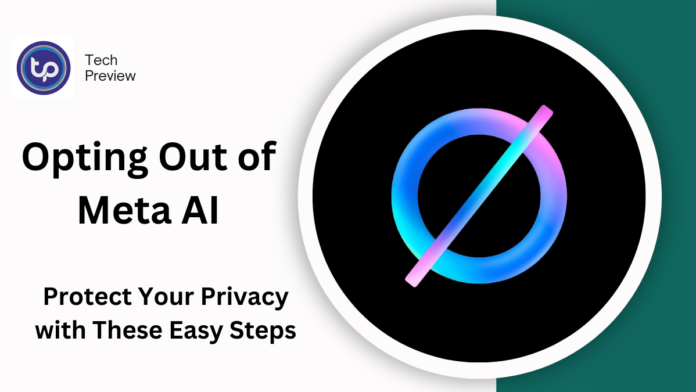In recent years, Meta (formerly Facebook) has integrated artificial intelligence (AI) features across its suite of platforms, including Facebook, Instagram, WhatsApp, and Messenger.
These AI-powered technologies have enhanced user experiences by offering personalized content, better friend suggestions, and targeted advertisements based on your online activity.
While many users appreciate the convenience of these features, there is a growing concern about privacy and the extent of data Meta collects for AI-driven functions.
What is Meta AI and Why Should You Care?
Meta AI refers to the artificial intelligence tools and algorithms developed by Meta to personalize your experience across its platforms.
These tools use your data—such as your activity, interactions, location, and preferences—to offer a tailored user experience. Meta AI powers a wide range of features, including:
- Personalized Ads: Ads that are served to you based on your interests, online behavior, and engagement with different content.
- Content Recommendations: Meta’s AI suggests new posts, pages, groups, and even friends that might interest you.
- Face Recognition: The AI automatically tags you or others in photos and videos based on facial recognition technology.
- Chatbots and Customer Support: AI-driven bots that interact with users and provide responses based on previous interactions.
- Enhanced Search Features: AI algorithms fine-tune your search results based on your activity on Meta platforms.
While these features are convenient and can make your experience on Facebook and Instagram more engaging, they rely on collecting a significant amount of data about you.
MUST READ: Google Gemini: Racing to Claim the AI Throne in 2025
Why Opt Out of Meta AI?
Opting out of Meta AI is important for several reasons:
- Data Privacy: Meta collects vast amounts of personal data to power AI algorithms. By opting out, you can limit how much data is shared and used for personalizing ads and recommendations.
- Reduced Tracking: AI allows Meta to track your activity across various platforms. Disabling these features will stop Meta from monitoring your interactions and behavior.
- Less Personalized Content: Although you’ll still see content, it won’t be tailored based on your data, which can lead to a more neutral browsing experience.
- Enhanced Security: Reducing AI-driven functions like facial recognition and data sharing with third-party apps decreases the potential risks of privacy breaches.
If you’re ready to regain control over your personal data, here’s how to disable Meta AI features across its platforms.
How to Opt Out of Meta AI
Opting out of Meta AI is a straightforward process, and it can be done by adjusting privacy settings within each Meta platform. Below, we’ll walk you through how to disable AI features on Facebook, Instagram, and other Meta apps.
Step 1: Turn Off Personalized Ads on Facebook
Meta customizes ads based on your browsing activity, interests, and online behavior. If you’d prefer not to see ads tailored specifically to you, here’s how to turn off personalized ads on Facebook:
- Open Facebook and go to Settings.
- Navigate to Ads under the Settings menu.
- Under Ad Settings, disable the following options:
- Ads based on your activity: This prevents Facebook from using your interactions across other apps and websites to show you personalized ads.
- Ads based on data from partners: Turn this off to stop Meta from using data shared by third-party apps and websites for ad targeting.
- Ads that include your social actions: Disable this if you don’t want your likes, comments, and shares to appear in ads.
By making these changes, you’ll limit the personalization of the ads you see, although you will still be shown ads—they just won’t be tailored to your behavior.
Step 2: Disable AI-Driven Recommendations on Instagram
Instagram’s AI suggests content such as posts, friends, and hashtags based on your activity. To stop these suggestions, follow these steps:
- Open Instagram and go to Settings.
- Under Privacy, go to Activity Status and turn it off to prevent the platform from recommending new content based on your engagement.
- In Settings > Ads, toggle off the personalized ad settings under Ad Preferences.
To limit content recommendations entirely, navigate to Feed Preferences under the Settings and turn off options related to Suggested Posts and Suggested Follows.
Step 3: Turn Off Face Recognition on Facebook
Meta uses AI for face recognition to automatically tag you and your friends in photos and videos. If you prefer to keep your face off Meta’s radar, follow these steps:
- Go to Settings on Facebook.
- Under Face Recognition, select No when asked if you want Facebook to recognize you in photos and videos.
Turning off face recognition will stop Meta from using AI to detect and tag you in images. However, it’s important to note that even if you disable this feature, other users may still tag you manually.
Step 4: Opt-Out of AI Research Programs
Meta often uses user data for AI research and development, helping improve its algorithms. If you’d prefer not to participate in these research initiatives, you can opt out by following these steps:
- Go to Settings on Facebook.
- Under Your Facebook Information, select Manage Your Data.
- Disable participation in research programs under Manage Participation.
By opting out of research programs, Meta will not use your data to enhance its AI models.
Step 5: Disable Data Sharing with Third Parties
Meta shares your data with third-party companies for advertising and other purposes. To minimize how much of your data is shared, adjust your settings by:
- Going to Settings on Facebook or Instagram.
- Select Privacy > Apps and Websites.
- Turn off any data-sharing options that grant third-party access to your personal data.
What Happens After You Opt-Out?
Once you opt out of Meta AI features, you will experience several noticeable changes across your accounts:
- Less Personalized Content: Content suggestions and posts from friends, groups, or pages will be less tailored to your interests and preferences.
- General Ads: You will still see ads, but they will be generic and not based on your browsing habits or social interactions.
- No Face Recognition: Meta will no longer auto-tag you in photos or videos using its AI technology.
- Less Data Collection: Your personal activity will be less tracked, meaning Meta will have less data to use for future AI-driven recommendations and features.
These changes may make your experience on Meta platforms feel less engaging, but they will give you greater control over your personal information and reduce the overall influence of Meta AI.
Alternatives to Deleting Your Meta Account
Opting out of Meta AI doesn’t require you to delete your account, but if you are serious about your privacy, here are some alternatives:
- Limit Usage: If you don’t want to deactivate or delete your account, simply reduce the time you spend on Meta platforms or avoid using features that rely heavily on AI.
- Deactivation: Temporarily deactivate your Meta account if you need a break from the platforms.
- Permanent Deletion: If you’re determined to leave Meta entirely, you can permanently delete your account.
Conclusion
Meta AI is at the heart of many personalized features across Facebook, Instagram, and other Meta platforms. While it offers a more tailored user experience, the collection and use of personal data for AI-driven services raise valid privacy concerns.
By following the steps outlined in this guide, you can opt out of Meta’s AI features, limiting the data collection, personalized ads, content recommendations, and face recognition.
Whether you’re looking to reduce the tracking or simply want to regain control over your privacy, opting out is a powerful step towards maintaining your digital autonomy.
The process is simple, and the benefits of protecting your privacy outweigh the inconvenience of a less personalized social media experience.
People May Ask
1. What is Meta AI?
Meta AI refers to the artificial intelligence features used by Meta platforms (such as Facebook, Instagram, and WhatsApp) to personalize user experiences. These AI features include personalized ads, content recommendations, face recognition, and other data-driven functionalities.
2. Why would I want to opt out of Meta AI?
Opting out of Meta AI helps you maintain greater control over your personal data. It reduces the amount of data Meta collects and limits how it is used for targeting ads, recommending content, or tracking your activity across different platforms.
3. Can I still use Facebook and Instagram if I opt out of Meta AI?
Yes, you can still use these platforms if you opt out of Meta AI. The only difference will be that your experience will no longer be personalized based on your data. You will still see content, but it won’t be tailored to your preferences or interests.
4. Will opting out stop all Meta AI features?
Opting out will disable most AI-driven features like personalized ads, face recognition, and content recommendations. However, some basic AI functions might still be active, such as spam detection and security-related features.
Click here to learn more.








